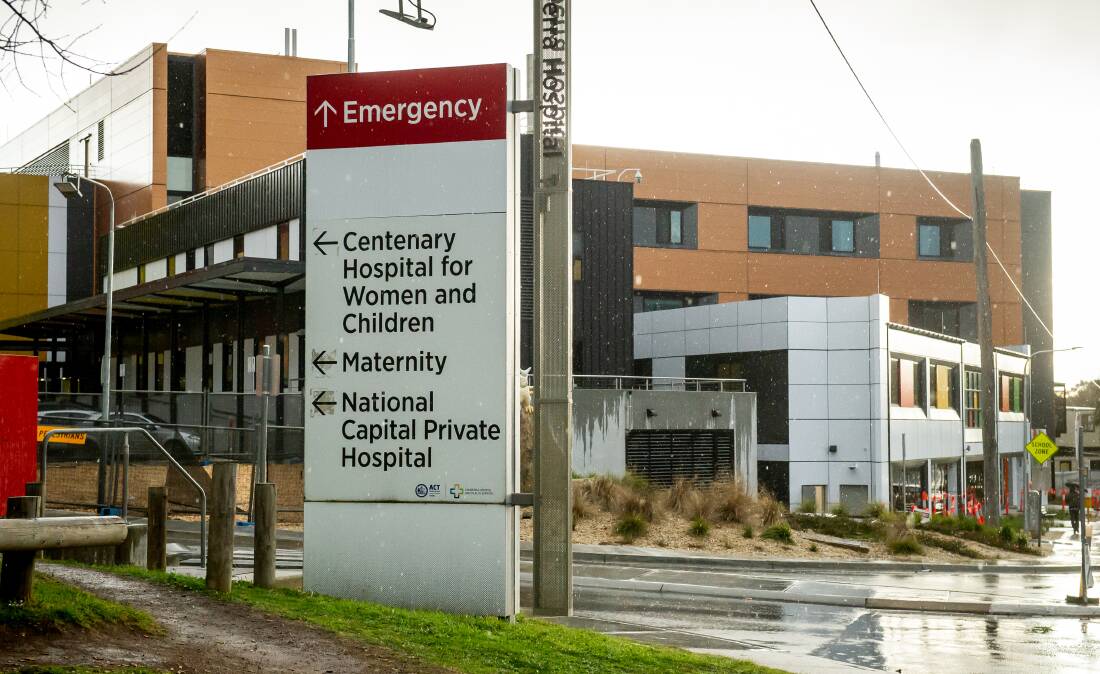Senior midwives at Canberra's women's and children's hospital warned their bosses of "critical shortcomings" and safety concerns in the hospital's birth suite ahead of an emergency being declared due to staff shortages.
A letter from a group of midwives at the Centenary Hospital, seen by The Canberra Times, warned shortfalls in the birth suite contributed to delayed care and could also result in poor outcomes.
"Chronic roster shortfalls in birth suite contribute to delayed patient care, may contribute to patient dissatisfaction with our health service, and may contribute to poor outcomes," the letter said.
"Chronic roster shortfalls certainly affect the morale and resilience of midwives who work in this high acuity setting."
'Massive exodus'
The letter, addressed to executives in the unit, said there had been a "massive exodus" of birthing midwives and other midwives had given a "point blank refusal" to rotate or relieve in the birth suite.
This meant shortfalls were filled by staff who had to work overtime or double shifts "up to 18 hours in length" and they did this "out of concern that women in our care will not receive adequate care due to inadequate resourcing".
"Birth suite midwives self-report feeling exhausted and burnt out," the letter said.
"Staff also report that they are made to feel guilty or justify why they can't stay for overtime or pick up extra shifts."
Staff had also been "bombarded" with requests to take on extra shifts and additional hours, including during days off and during annual and personal leave.
The letter said in the space of a week midwives in the birth suite had been sent 25 messages about taking extra shifts.
"This constant bombardment and expectation that staff will fill roster shortfalls may contribute to increased use of sick leave, and feelings of anxiety and burnout, as even on days off from work, pressures at work encroach on downtime," the letter said.
The midwives expressed fear these known shortages contributed to difficulties in recruiting new staff.
'A lot of work underway'
The letter from the midwives was sent in March this year and was sent from 14 senior midwives.
A Canberra Health Services spokeswoman said there had been a series of meetings with the group since the letter had been written to work through the concerns raised.
"There is a lot of work underway across CHS to address the workforce shortages that we are experiencing in these areas," the spokeswoman said.
"We want to reassure the community that the quality of care within our maternity services is being maintained during this time.
"There was a lot of consideration that went into writing this letter and we thank our senior midwives for their advocacy and their ongoing dedication and care they provide to the community."

The spokeswoman said the service sought to address a request from the midwives for a "swift implementation of change" around resourcing through prioritising recruitment and had accelerated a graduate diploma program for midwifery. The hospital has also established a position for a director of midwifery.
But Canberra Health Services was forced to enact a "code yellow" due to staffing pressures in the maternity ward in mid-August and this was in place for nearly a month.
A "code yellow" is part of Canberra Health Services' emergency management plan and "is activated when infrastructure and/or other internal emergencies affect service delivery standards both internal and external buildings".
The spokeswoman said the Centenary Hospital and North Canberra Hospital were working together to manage the current demand for maternity services and agency and locum midwives had been hired to meet the demand.
"We are also successfully using long-term agency midwives as required to support staff and ensure ongoing quality care for women and their families, while we actively recruit to vacancies," the spokeswoman said.
The midwives said they wanted Canberra Health Services to develop a retention strategy and consider bonuses or other incentives to retain and value midwives.
'Disastrous for birthing'
The midwives also said beds were capped and there was "bed blocking behaviour" on the antenatal and postnatal wards and they wanted an immediate end to this.
"To be clear, we are asking that the wards are to be open to capacity at all times, that is 15 beds each," the letter said.
"The decision by management to close beds [on the wards] has been disastrous for birthing."
The spokeswoman said the service acknowledged concerns had been raised and there had been "considerable effort" to tackle this but it was a complex issue. A new unit had also opened in recent months which helped with additional surge.
"Bed management is complex to ensure people can access the services and care they need at the right time. In managing our bed numbers we consider demand across all our units and staffing capacity at any given time," she said.
"We have been looking at ways to improve discharge processes and are working with our care partners to help improve patient flow into community care."







